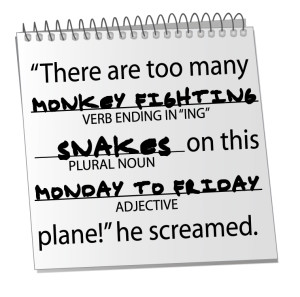
But I like making stuff! — CC image “Chevy Worked Hard Building His Own Snowman” courtesy of Chevysmom on Flickr. Some rights reserved.
Going to the library should not have been a big deal.
It’s pretty small stuff. Question: where will I do my writing today? Answer: the library.
Done.
It’s like the dilemma about changing the channel on the TV when you can’t find the remote. Truly, not worth thinking about for more than 2 seconds. Library: quiet, air conditioned, no distractions. [1] A good place to do thoughtful work.
Except I questioned that should take that step, and almost got zero writing done that day as a result.
The easy way out of creativity
Have you ever known you needed to do something, but were looking for the easy way out?
Like most creative people, I’m fairly bruised from falling off and jumping back on the wagon of disciplined work. On a recent foray into more structured creative behavior, I came across this article from the Huffington Post outlining five bad habits that freelancers fall into. Number 5: Working From Your Bedroom caught my eye particularly.
“Working in your bedroom is only one step away from doing the laundry, two steps away from taking a nap, and three steps away from cooking in the kitchen,” #5 says. “Studies also show that working from your bedroom can cause you to have problems sleeping and resting when you’re not working.”
Hmm.
I’ve written before about the benefits of literally taking a new perspective — sitting in a new seat in your room or office when you work, for example. So I responded to the common-sense nature of Voakes’ advice right away. Great, I thought. Today I’ll go to the library!
Then I thought, If only it wasn’t 90 degrees outside…
Artists’ no. 1 excuse: If only…
Beware this phrase. Have you ever caught yourself using it? “If only” is the number one way our Inner Procrastinator brainwashes us. “If only [XYZ condition were met], I’d have this all taken care of…”
Which really translates into, “I’m letting myself off the hook by choosing a precondition that I know won’t be met. Sorry, art!”
Who cares if it’s 90 degrees outside? The library is air conditioned! Staying at home, faffing on the computer, would have been just as absurd as refusing to change the TV channel because I don’t want to get up out of my chair and the batteries are dead in the remote.
I had a goal to do creative writing work. I had decided to take both my own good advice on changing my physical perspective, and the accepted wisdom of freelancers everywhere that sometimes, we really do need to get out of the house to get things done. Going to the library would accomplish both goals.
Except getting there meant walking for nearly half an hour in the heat, getting even more hot and sweaty than I already was.
Now, I ask you, is that really a bad thing?
Work should make you sweat
Michael Phelps didn’t become an Olympic swimmer by sitting on his hands. Charles Dickens didn’t publish more than 30 books (but who’s counting?) by fretting about the temperature. And neither will you or I ever get where we want to be, creatively, if we’re afraid of a little sweat.
Which is why I think sweating the small stuff is a great strategy for getting creative work done. Working at the library versus working at home? Not a big deal, really…
Getting zero words on paper versus three hours of focused, dedicated writing and nearly two completed drafts?
Definitely worth the sweat.
===
What did you sweat creatively this week?
1. Unless you count books, of course. Those distract me all the time, but ironically, the otherwise siren call of literature becomes a soothing hum when I’m doing my own work surrounded by hundreds of tomes.
Back to the text




